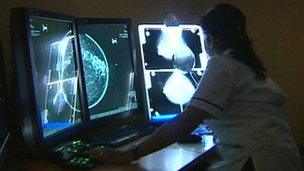Breast cancer screens leads to 'unnecessary treatment'
- Published

To screen or not to screen?
Up to one-in-four breast cancers detected by screening would never have gone on to be fatal or cause any symptoms, US researchers say.
Their study based on 39,888 women in Norway said between 15% and 25% of breast cancers were "overdiagnosed".
They said this led to unnecessary treatment such as surgery, chemotherapy or radiotherapy.
In England, the evidence for screening is being reviewed amid controversy about the measure's effectiveness.
Health bodies around the world work on the principle that breast cancer screening saves lives. However, some researchers have argued that it may cause more harm than good.
A review of clinical trials involving a total of 600,000 women concluded it was"not clear whether screening does more good than harm", external.
Norway investigation
Academics at Harvard School of Public Health looked at nearly 40,000 cases of breast cancer in Norway. They took advantage of a natural experiment to determine the effect of screening as different regions in Norway introduced screening at different times between 1996 and 2005.
The findings, presented in Annals of Internal Medicine, showed 15% and 25% of breast cancers were "overdiagnosed" by screening.
This worked out at preventing one death for every 2,500 women screened, but six to 10 cases of overdiagnosis.
Researcher Dr Mette Kalager said: "Mammography might not be appropriate for use in breast-cancer screening because it cannot distinguish between progressive and non-progressive cancer.
"Radiologists have been trained to find even the smallest of tumours in a bid to detect as many cancers as possible to be able to cure breast cancer.
"However, the present study adds to the increasing body of evidence that this practice has caused a problem for women - diagnosis of breast cancer that wouldn't cause symptoms or death."
The national cancer director for England, Prof Mike Richards, has announceda review into breast cancer screening, external.
Dr Julie Sharp, Cancer Research UK's senior science information manager, said: "Cancer Research UK is working with the National Cancer Director on an independent review of breast screening.
"Women need more accurate, evidence-based and clear information to be able to make an informed choice about breast screening. The decision whether to be screened is a personal one and that decision should be made with all of the potential harms and benefits fully explained.
"Until we have the results of the review, Cancer Research UK's position is that we remain supportive of breast screening."
Dr Caitlin Palframan, policy manager at Breakthrough Breast Cancer, said: "The rate of overdiagnosis in breast cancer screening has been debated widely and led to confusing messages for women on the effectiveness of breast screening.
"However, we believe that screening is vital as it helps detect breast cancer early when treatment options are likely to be less aggressive and have more successful outcomes."
A Department of Health spokesman said: "Our screening programme is regularly scrutinised.
"We know that there are some scientists who differ in their views towards screening, so as requested by ministers, the National Cancer Director Professor Sir Mike Richards has commissioned an independent review of the evidence in partnership with Harpal Kumar, chief executive of Cancer Research UK."
The review will publish its findings later this year.
- Published26 October 2011
- Published29 July 2011